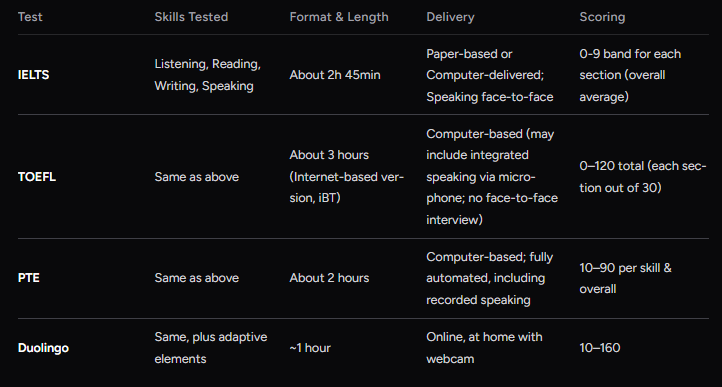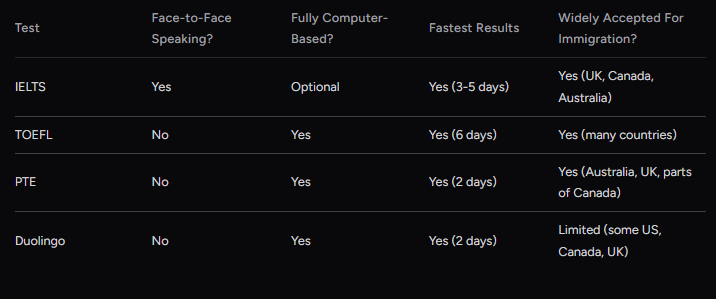IELTS vs. TOEFL vs. PTE (and More): Which English Test Should You Choose?
Confused about the difference between IELTS, TOEFL, and PTE? This comprehensive post breaks down the key features, formats, scoring systems, and recognition of the world’s top English proficiency tests.
8/12/20252 min read
If you are planning to study, work, or immigrate to an English-speaking country, you’ll almost certainly need to prove your English language skills — and that usually means taking a widely-recognized proficiency test. While IELTS is one of the most popular options globally, other major tests like TOEFL, PTE, and a few others are also accepted by universities, employers, and government agencies.
But how do these tests differ, and which one is right for you? Here’s a breakdown of the main differences, with practical tips to help you make the best choice.
1. Test Providers and Recognition
IELTS (International English Language Testing System)
Jointly managed by the British Council, IDP: IELTS Australia, and Cambridge English. Recognized by over 11,000 institutions worldwide, including schools, immigration authorities, and professional bodies.TOEFL (Test of English as a Foreign Language)
Run by ETS (Educational Testing Service), based in the USA. Widely accepted by US and Canadian schools, but also recognized globally.PTE Academic (Pearson Test of English)
Offered by Pearson PLC. Increasingly recognized in Australia, the UK, and other countries for student visas and university admissions.Others (Duolingo English Test, Cambridge English Exams, OET for healthcare, etc.)
Some universities accept these, but they may have more limited recognition.
2. Test Structure & Format
Key Differences:
IELTS speaking uses a real human examiner, while TOEFL and PTE assess speaking via a microphone and AI.
PTE and TOEFL are entirely computer-based; IELTS offers both computer and paper forms.
IELTS test centers offer the exam over multiple days (especially for speaking), while the other tests are completed in one sitting.
3. Scoring System
IELTS: Band system (0 to 9), you get a score for each skill and an overall average.
TOEFL: Each section scored out of 30, for a total of 120.
PTE: Score ranges from 10 to 90.
Duolingo: Scored out of 160.
All these scores can be mapped to CEFR (Common European Framework of Reference for Languages) bands for equivalence.
4. Test Content & Difficulty
IELTS often uses British accents and spelling and includes a variety of international English, while TOEFL tends to focus on North American English.
TOEFL reading and listening sections are sometimes considered slightly more academic, while IELTS includes more general topics.
PTE is highly automated and uses a lot of real-life scenarios and integrated tasks (for example, summarizing a spoken passage).
Speaking Experience: Some test-takers are more comfortable with a face-to-face interview (IELTS); others prefer speaking into a headset (TOEFL, PTE).
5. Availability, Fees, and Result Times
IELTS: Offered frequently worldwide; price varies ($200–$370 USD); results in 3–5 days (computer), or up to 13 days (paper).
TOEFL: Widely available; $200–$250; results within 6 days.
PTE: Similar pricing; results come fast (within 2 days).
Duolingo: Affordable and fastest (results in 2 days); remote test but not accepted everywhere.
6. Which Test is Easier?
There’s no universal "easier" test—it depends on your strengths, your comfort with computers, and whether you prefer to speak with an examiner or into a mic. Many who do well with real conversation prefer IELTS, while tech-savvy test-takers may like PTE.
Conclusion: Which Test Should You Choose?
Check your institution or immigration requirements first—they may only accept one or have a preference.
If you’re comfortable with computers and want quick results, PTE or Duolingo may suit you.
If you want a face-to-face speaking test, IELTS is unique.
For US/Canada study, TOEFL remains the standard, though most now accept both IELTS and TOEFL.
Duolingo is still less widely accepted but growing fast.
Whichever you choose, know that all these tests are challenging and internationally respected measures of English proficiency. Always double-check requirements before booking your test to make sure your scores will be accepted!
Summary Table




